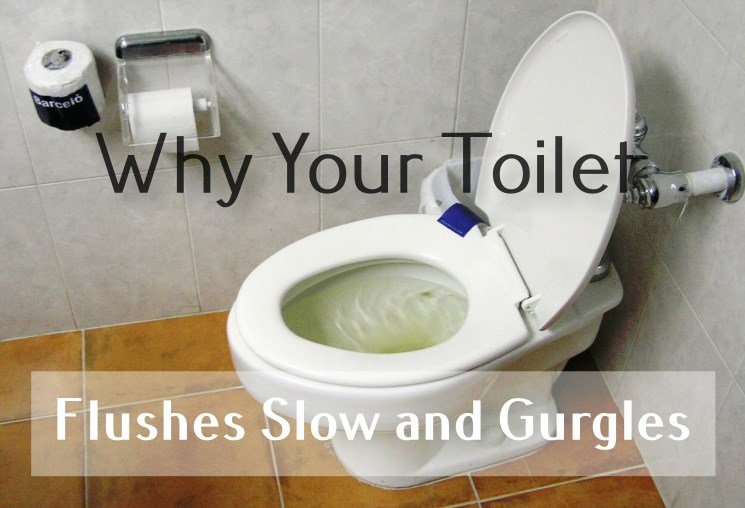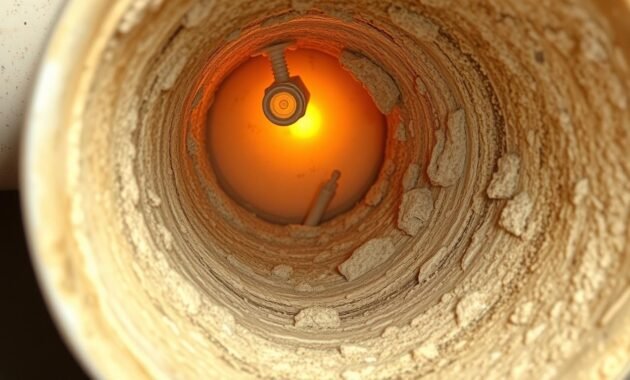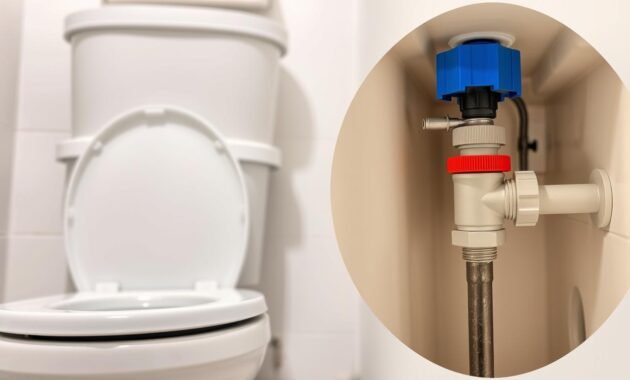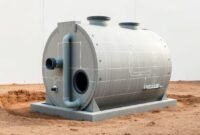Are you tired of a toilet that flushes slow and gurgles? These issues can really get on your nerves. A gurgling toilet is not just a nuisance. It’s a sign of possible serious problems in your pipes.
When your toilet flushes slow and makes weird noises, it’s more than a hassle. It could mean there are hidden blockages or other plumbing issues. These problems can get worse if you don’t address them.
Read also: Why Your Toilet Flushes Slow and Gurgles
I’ll explain the main reasons for your gurgling toilet. You’ll learn what’s causing it and how to solve it. Whether it’s a simple clog or a bigger pipe problem, this guide will help you fix it.
Understanding the Warning Signs of Toilet Problems
Spotting early signs of plumbing trouble can prevent expensive fixes and messes. Your toilet shows signs of trouble through specific symptoms. It’s important to pay attention to these.

Common Symptoms to Watch For
When facing clogged toilet issues, look out for these red flags:
- Unusual gurgling sounds when flushing
- Water bubbling in the toilet bowl
- Slow drainage during flush
- Spontaneous toilet flushing without manual activation
- Fluctuating water levels in the bowl
Why These Signs Shouldn’t Be Ignored
Ignoring these signs can lead to big problems with blocked drains and plumbing. What seems small can turn into a big repair job fast.
Impact on Your Plumbing System
These symptoms point to deeper plumbing issues in your home. Ignoring them can harm your waste removal system. This can cause:
- Pipe damage
- Sewage backups
- Potential structural water damage
- Expensive emergency repairs
By watching for these signs early, you can keep your plumbing system safe. This avoids costly and unexpected repairs.
How Toilet Plumbing Systems Work
Your toilet’s plumbing system is a complex network of parts that work together. They manage waste efficiently. Knowing how they work can help you fix problems before they get worse.
The system relies on precise water flow and air pressure. The main parts are:
- Toilet Bowl: The main place for waste
- Water Tank: Holds and releases water for flushing
- Drain Line: Takes waste away from your home
- Vent Stack: Keeps air pressure right in the plumbing
- Sewer Line Connection: Links to the city’s waste system
When you flush, water from the tank goes into the bowl. This creates a siphon effect that pulls waste down the drain. The vent stack is key for keeping air pressure right. This stops water from getting stuck or making gurgling sounds.
Each part must work well for waste to be removed smoothly. If not, you might get slow flushes, strange noises, or blockages. Keeping your toilet in good shape can stop these problems and make your bathroom last longer.
Toilet Flushes Slow and Gurgles: Main Causes Explained
Figuring out why your toilet is slow and gurgles can prevent big plumbing problems. These sounds and slow flushing are signs of deeper issues that need attention.
Read also: Toilet Bubbling When the Shower is Running?
When your toilet starts gurgling, it’s time to look into why. Several things could be causing this. Let’s explore the main reasons for a slow-draining toilet and the sounds that come with it.
Negative Air Pressure Troubles
Negative air pressure can mess with your toilet’s performance. It happens when pipes get blocked, causing air to find its way out in weird ways. This leads to gurgling sounds that make you curious about your plumbing.
- Blocked vent pipes disrupt normal air flow
- Trapped air creates pressure differential
- Gurgling indicates air seeking alternative escape routes
Water Flow Challenges
Water flow issues can really slow down your toilet. If the tank or bowl doesn’t have enough water, waste can’t be flushed properly. This results in a toilet that drains slowly and can’t clear waste well.
- Insufficient water in tank reduces flush power
- Misaligned fill valves create inconsistent water levels
- Partial clogs restrict smooth water movement
Pipe System Complications
Your home’s pipes are a complex network that can face many problems. From small blockages to big structural issues, pipe problems can make flushing the toilet a hassle.
- Mineral buildup narrows pipe diameter
- Tree root intrusions can damage underground pipes
- Aged pipes become more susceptible to blockages
Knowing these common causes helps you keep your toilet in good shape. It also stops bigger plumbing problems from happening.
Mineral Buildup and Hard Water Deposits

Mineral buildup is a sneaky problem many homeowners face. Hard water minerals like magnesium, calcium, and potassium build up in your toilet’s pipes. This can lead to repair headaches.
These minerals form stubborn deposits that harm your toilet’s performance. You might see a chalky, rust-colored ring in your toilet bowl. This is a sign of mineral buildup. These deposits are not just ugly; they can cause serious problems over time.
- Mineral deposits can narrow pipe diameter
- Reduce water flow efficiency
- Create possible blockage risks
- Decrease overall toilet performance
To fight mineral buildup, regular toilet maintenance is key. Vinegar or specialized descaling products can help remove deposits. For severe buildup, you might need professional help to clear your pipes and restore function.
Preventing buildup is important. Installing a water softener or using filtration systems can help. These steps can make your toilet last longer and save you from expensive repairs later.
Clogged Waste Pipe Problems and Solutions
Dealing with a clogged toilet can be frustrating and messy. Understanding the types of waste pipe clogs and how to address them can save you time, money, and unnecessary stress. I’ll walk you through the most common waste pipe blockage issues and practical solutions for keeping your plumbing running smoothly.
Types of Waste Pipe Clogs
Waste pipe clogs come in various forms, each with unique challenges. The most common types include:
- Organic waste buildup
- Toilet paper accumulation
- Foreign objects accidentally flushed
- Mineral and sediment deposits
Professional vs DIY Unclogging Techniques
When facing a clogged toilet, you have two primary options. Some blockages can be resolved using simple drain cleaners and plunging techniques, while others require professional intervention.
- DIY Solutions:
- Plunger
- Toilet auger
- Enzyme-based drain cleaners
- Professional Services:
- Advanced camera inspection
- Hydro-jetting
- Pipe repair or replacement
Prevention Methods
Preventing waste pipe clogs is easier than fixing them. I recommend implementing these strategies to maintain clear pipes:
- Use septic-safe toilet paper
- Avoid flushing non-biodegradable items
- Regular pipe maintenance
- Install drain screens
Knowing when to use DIY unclogging techniques and when to call a professional can protect your plumbing system from extensive damage. Always prioritize preventative maintenance to minimize the risk of serious waste pipe clogs.
Read also: Sink Not Draining But Pipes Clear
Vent Stack Blockages and Their Effects
Your home’s plumbing system has a key part called the vent stack. This vertical pipe goes through your roof. It’s vital for keeping air pressure right and your plumbing working well. But, when vent stack problems happen, they can turn a quiet bathroom into a gurgling toilet mess.
Read also: Pipe Jacks Roofing Installation over the Roof Pipe Vent
The vent stack does many important things for your plumbing:
- It keeps air pressure balanced in pipes.
- It stops sewer gases from getting into your home.
- It helps waste and water move smoothly through pipes.
- It removes harmful methane gases.
Blockages in the vent stack can really mess with your plumbing. Common causes include:
- Fallen leaves and debris.
- Animal nests.
- Dead animals.
- Ice and snow buildup.
When the vent stack gets blocked, your plumbing system’s air pressure drops. This makes water flow poorly, causing toilets to gurgle and drains to drain slowly. Spotting these signs early can save you from costly plumbing fixes.
| Vent Stack Blockage Symptoms | Potential Consequences |
|---|---|
| Gurgling toilet sounds | Potential sewer backup |
| Slow drainage | Reduced pipe efficiency |
| Sewage odors | Indoor air quality issues |
Professional plumbers can find and fix vent stack problems fast. They make sure your plumbing system works well and efficiently.
Main Sewer Line Issues and Symptoms
Sewer line problems can turn a simple plumbing issue into a big headache for homeowners. When your toilet starts gurgling, it’s important to know what’s happening under the surface.
Many plumbing issues with main sewer lines come from different sources. This makes it hard for property owners to deal with. Tree roots, ground shifts, and pipe wear are main causes that can harm your drainage system.
Signs of Sewer Line Problems
- Multiple drains backing up at once
- Persistent gurgling sounds from toilets
- Foul sewage smells around your property
- Unexplained wet patches in your yard
- Slow drainage across many fixtures
When to Contact Municipal Services
Figuring out if sewer line issues are yours or the city’s can be tricky. Look for specific signs that point to a bigger problem.
| Indicator | Property Issue | Municipal Problem |
|---|---|---|
| Neighborhood Impact | Single home affected | Multiple homes experiencing issues |
| Problem Location | Within property lines | Beyond property boundary |
| Drainage Behavior | Isolated fixture concerns | Widespread system failures |
If you think your gurgling toilet septic tank is part of a bigger city sewer problem, call local water services right away. Getting a professional to check it out can save you a lot of time and money.
Water Level Problems in Tank and Bowl

When your toilet bubbles when flushed, it might be signaling a water level problem. I’ve seen countless toilet repair situations where incorrect water levels cause frustrating flush issues. The tank and bowl require precise water measurements to function correctly.
Water level problems typically manifest through several key symptoms:
- Weak or inconsistent flushing
- Unusual gurgling sounds
- Incomplete waste removal
- Visible water level variations
Understanding tank water levels is key. The fill valve controls how much water enters the tank after each flush. When this mechanism malfunctions, your toilet’s performance suffers. A standard toilet tank should fill to about an inch below the top of the overflow tube.
Diagnosing water level issues involves checking multiple components. The float mechanism might need adjustment, or the fill valve could require replacement. Simple toilet repair techniques can often resolve these problems without professional intervention.
Here are some quick diagnostic steps:
- Check the float’s position
- Inspect the fill valve for damage
- Look for visible leaks
- Verify water line markings
If toilet bubbles persist when flushed, and basic adjustments don’t help, it might be time to consult a professional plumber. Water level problems can indicate deeper plumbing system challenges that require expert attention.
Simple DIY Fixes for Minor Toilet Issues
Fixing toilet problems doesn’t always need a plumber. With the right tools and basic care, you can solve many small issues yourself. I’ll show you some easy DIY fixes that can save you time and money.
Mastering Plunging Techniques
Knowing how to plunge is key for homeowners. Here’s how to clear a clogged toilet:
- Choose the right plunger – a flange plunger works best for toilets
- Create a complete seal around the toilet bowl’s drain
- Use firm, consistent up and down motions
- Apply steady pressure without breaking the seal
Basic Maintenance Tips for Toilet Care
Regular care can stop many toilet problems. Here are some tips for drain cleaners and care:
- Clean your toilet bowl weekly with a toilet brush
- Use enzyme-based cleaners to break down clogs
- Check water levels in the tank monthly
- Avoid flushing non-biodegradable items
By using these simple unclogging techniques and maintenance tips, your toilet will work well. Remember, it’s easier to prevent problems than fix them later.
Conclusion
We’ve explored the world of toilet repair together. Issues like slow flushes and gurgles at the bottom need your attention. I’ve shown you how to diagnose and fix these problems to keep your toilet working well.
Knowing what causes toilet troubles helps you act fast. Problems like mineral buildup or sewer line issues can be fixed early. I’ve shared tips from DIY fixes to when to call a pro.
Your plumbing system needs regular care. By following our tips, you can avoid big problems and keep your toilet in top shape. Remember, prevention is better than fixing things after they break.
Now you’re ready to handle toilet problems with confidence. Say goodbye to slow flushes and gurgles. Your bathroom will run smoothly and efficiently.


